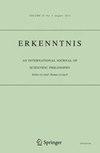Opaque Grounding and Grounding Reductionism
IF 0.8
2区 哲学
0 PHILOSOPHY
引用次数: 0
Abstract
Abstract This article aims to contribute to the largely neglected issue of whether metaphysical grounding – the relation of one fact’s obtaining in virtue of the obtaining of some other (or others) – can be given a reductive account. I introduce the notion of metaphysically opaque grounding , a form of grounding which constitutes a less metaphysically intimate connection than in standard cases. I then argue that certain important and interesting views in metaphysics are committed to there being cases of opaque grounding and demonstrate that four representative accounts of grounding available in the literature are unable to accommodate such cases. This is argued to constitute a problem for those accounts that is likely to extend to other possible reductive accounts of grounding that employ the popular strategy of explaining grounding in terms of other hyperintensional phenomena. Unless the reductionist is willing to opt for some sophisticated modalist account, the possibility of opaque grounding cases thus provides indirect support for primitivism about grounding, a view that has previously been widely embraced but rarely supported by argument.不透明的基础和基础还原论
摘要本文旨在探讨一个被忽视的问题,即形而上学的基础——一个事实的获得与另一个事实(或其他事实)的获得之间的关系——是否可以给予还原性的解释。我介绍了形而上学上不透明的基础的概念,这种基础的形式与标准情况相比,构成了一种不那么形而上学的亲密联系。然后,我认为形而上学中某些重要而有趣的观点致力于存在不透明基础的情况,并证明了文献中关于基础的四种代表性描述无法适应这种情况。有人认为,这对那些可能延伸到其他可能的基础还原解释构成了一个问题,这些解释采用了用其他高内涵现象来解释基础的流行策略。除非还原论者愿意选择一些复杂的情态论的解释,否则不透明的接地情况的可能性就为关于接地的原始主义提供了间接的支持,这种观点以前被广泛接受,但很少得到论证的支持。
本文章由计算机程序翻译,如有差异,请以英文原文为准。
求助全文
约1分钟内获得全文
求助全文
来源期刊

ERKENNTNIS
PHILOSOPHY-
CiteScore
2.10
自引率
11.10%
发文量
116
期刊介绍:
Erkenntnis is a philosophical journal publishing papers committed in one way or another to the philosophical attitude which is signified by the label ''scientific philosophy''. It concentrates on those philosophical fields which are particularly inspired by this attitude, although other topics are welcome as well. These fields are:- Epistemology - Philosophy of science, foundations and methodology of science in general and of natural and human sciences such as physics, biology, psychology, economics, social sciences in particular - Philosophy of mathematics - Logic, philosophy of logic, and all kinds of philosophical logics - Philosophy of language - Ontology, metaphysics, theory of modality - Philosophical psychology, philosophy of mind, neurophilosophy - Practical philosophy, i.e. ethics, philosophy of action, philosophy of law, etc. One of the objectives of Erkenntnis is the provision of a suitable platform for the discussion of controversial issues; another is the provision of timely, competent reviews of important publications in an ever-growing field of research.In recent years, philosophers standing quite outside the pale of analytic philosophy have also paid careful, and indeed most welcome, attention to precision of concept and language, to arguments, and to well-grounded foundations. Erkenntnis provides for them, and for philosophers of all persuasions, a place of meeting, of discussion, and of disputation.Erkenntnis was originally founded in 1930 by Rudolf Carnap and Hans Reichenbach, it was revived in 1975 by Carl G. Hempel, Wolfang Stegmüller, and Wilhelm K. Essler. You can find more information about this in the article “Hempel: The old and the new ‘Erkenntnis’” accessible in the tabs to the right.Today, Erkenntnis is one of the leading journals in philosophy worldwide and attracts first-class authors at all stages of career; from young philosophers at the PhD level up to established academic philosophers and highly renowned senior scholars. We pride ourselves on supplying our authors with substantial referee reports, subject to a turnaround time of about three months until the first decision. The acceptance rate for publications in the journal is presently slightly below 10%.
 求助内容:
求助内容: 应助结果提醒方式:
应助结果提醒方式:


